-
 Korea.net's 24-hour YouTube channel
Korea.net's 24-hour YouTube channel- NEWS FOCUS
- ABOUT KOREA
- EVENTS
- RESOURCES
- GOVERNMENT
- ABOUT US
The group included seven so-called "power bloggers," online writers with a wide following, such as Sun Jie, whose profile on Sina Weibo, a Chinese microblogging website, is particularly popular. The group also included Yi Zhenxing, director of an online-only soap opera, and Luan Yimei, a professor of media studies at Peking University. The group also included other influential figures who work in the broadcasting sector, such as Yang Ning, senior editor at China Radio International, Zhu Qin, announcer at Radio Beijing, Ren Shuai, editor-in-chief at the Xunlei Kankan online content producer, Zhuang Yuanyuan, senior reporter at Chinese Central Television (CCTV) and Wu Changsheng, senior editor at the People's Daily and senior consultant with the Global Times.
Arriving in Korea on June 16, the group has been touring Korea and paying visits to prominent locations associated with Korean media and the environment. On June 19, they attended a dinner hosted by the Korean Culture and Information Service (KOCIS), part of the Ministry of Culture, Sports and Tourism (MCST) and publisher of Korea.net, to share their opinions and to improve communications between the two bodies.
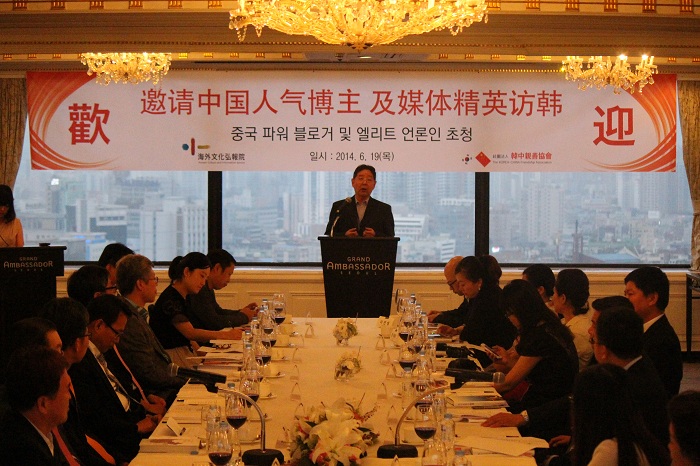
Korean and Chinese attendees, all working in the broadcasting sector, exchange their opinions on the development of bilateral relations. (photo: Wi Tack-whan)
During the banquet, Lee Se-ki, head of the Korea-China Friendship Association, emphasized that more efforts must be made to enhance friendship and cooperation between the two countries. "Korea and China are great partners that should go hand in hand. Now is the time for us to establish a new partnership," said Lee. "This year's visit will hopefully bear fruitful results, not only for our individual careers, but also for a strengthened partnership between our two countries," Lee said.
KOCIS Director Won Yong-gi also delivered a welcoming message. "Looking back on my working experience at KOCIS, we have had no difficulties in carrying out projects related to China. Everybody acknowledges the possibility and supports the projects," Won explained, hoping for, "further cooperation in the fields of music, video games and animated characters, following last year's successfully joint produced movies."
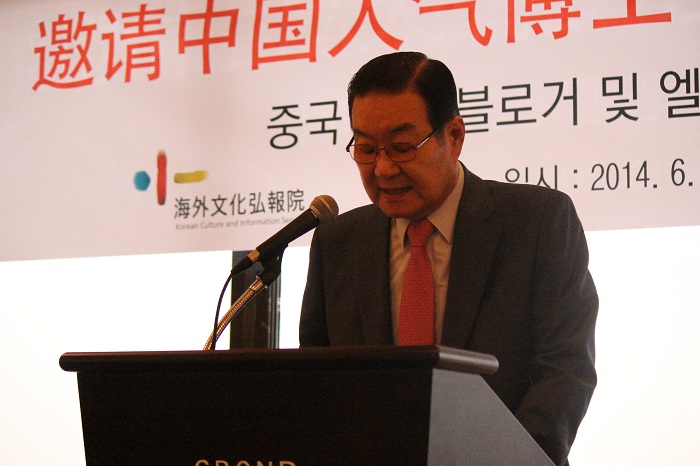
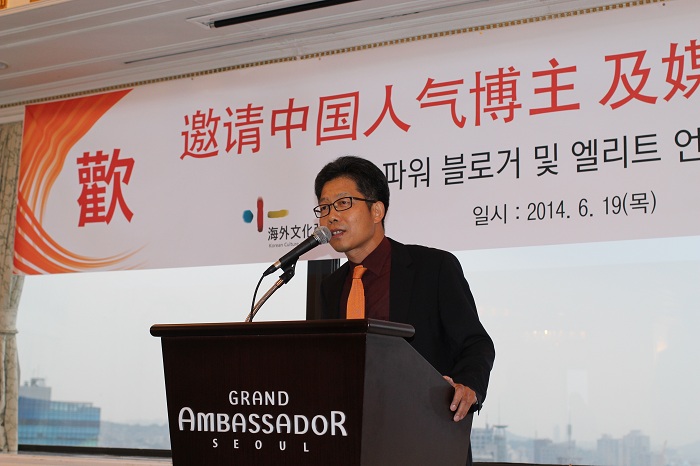
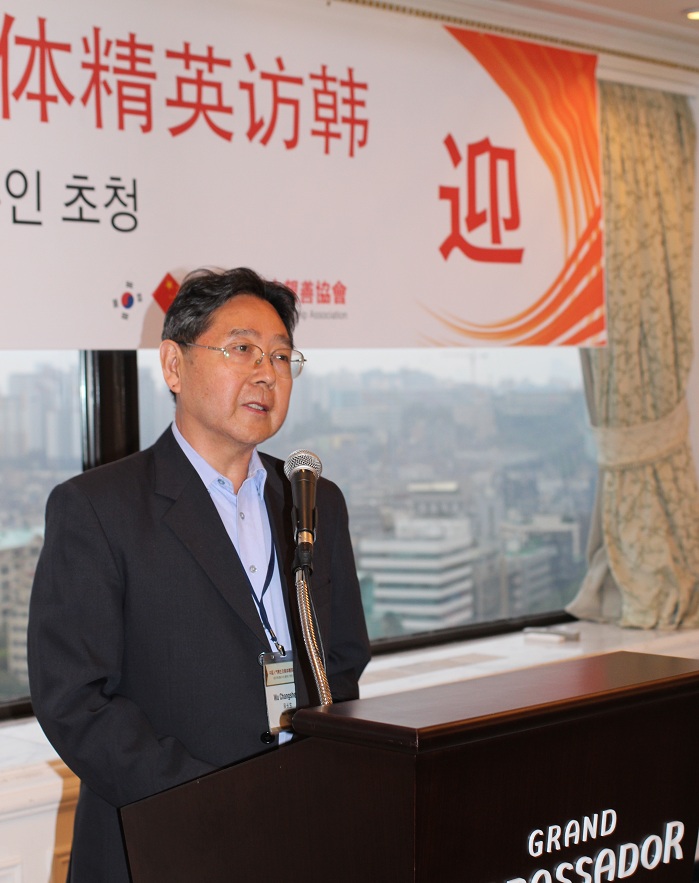
Representatives of Korean and Chinese citizen groups deliver speeches at the banquet. Pictured is Lee Se-ki of the Korea-China Friendship Association (top), Director Won Yong-gi of KOCIS (middle) and Wu Changsheng, who represent the Chinese delegation. (photos: Wi Tack-whan)
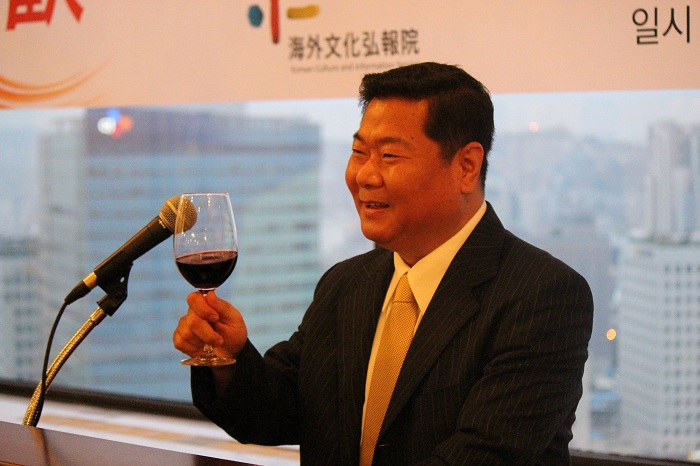
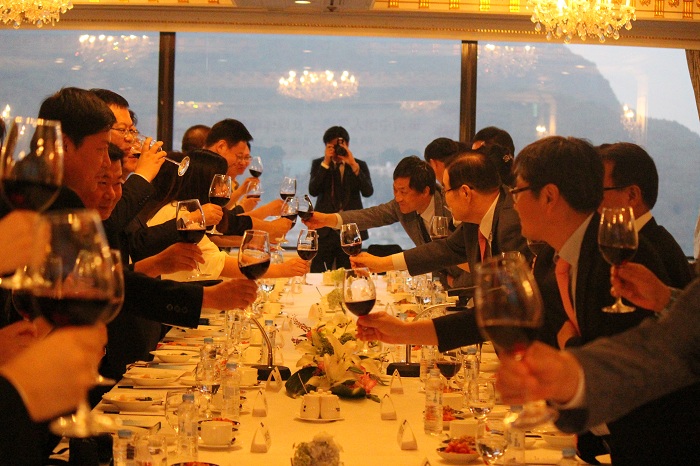
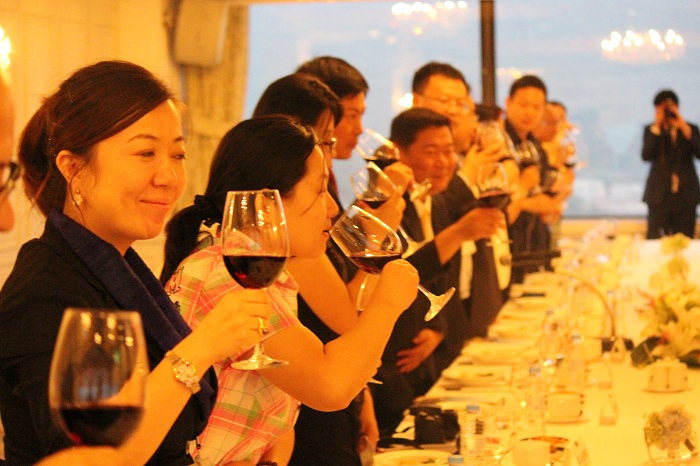
Cultural Attaché Shi Ruilin from the Chinese embassy in Seoul offers a toast (top) and conference attendees from both countries enjoy their drink (bottom). (photo: Wi Tack-whan)
In return, Wu Changsheng, head of the Chinese delegation, emphasized that, "China and Korea share a lot in common in the cultural sphere." Wu continued, saying that, "Those of us who have come here this year are from a variety of backgrounds. We want to look at Korea from different perspectives and extend our understanding of your country."
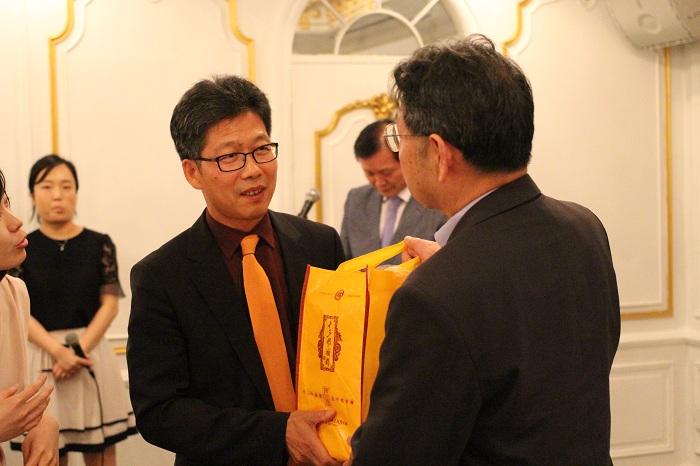
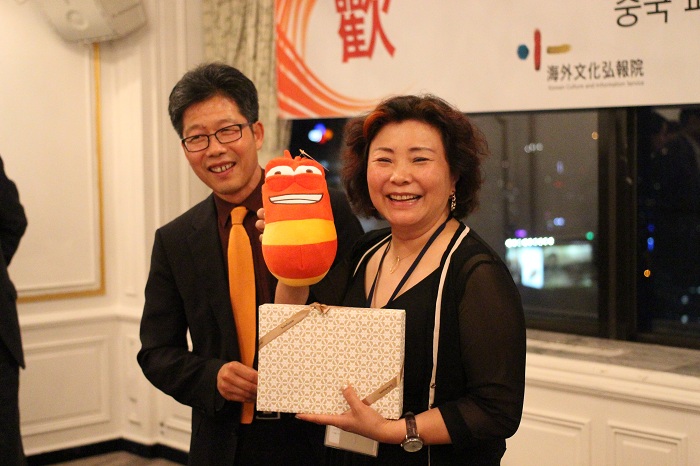
(Top) Wu Changsheng, head of the Chinese delegation, presents a bottle of Chinese traditional alcohol as a gift to Director Won Yong-gi of KOCIS. (Bottom) Director Won gives a gift to Zhuang Yuanyuan, senior reporter at CCTV. (photos: Wi Tack-whan)
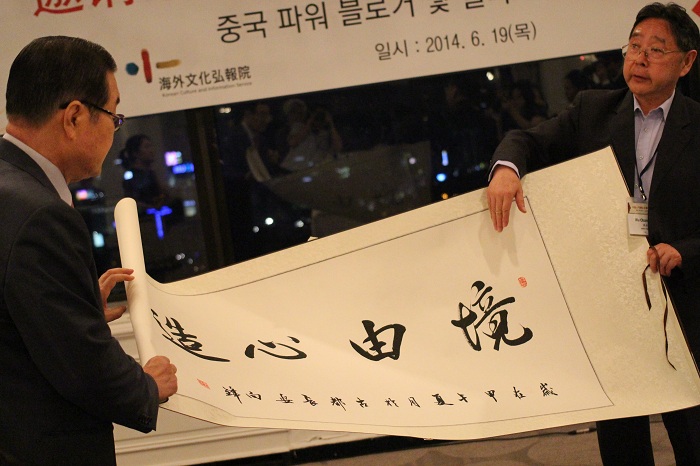
The head of the Chinese delegation, Wu Changsheng, presents to Lee Se-ki, head of the Korea-China Friendship Association, a gigantic paper with a famous Chinese phrase written on it. It reads Jing You Xin Zao, or 境 由 心 造, meaning that, "The good and the bad things about our environment depend on one's mind and attitude." (photo: Wi Tack-whan)
During the course of their four-day stay in Korea, the Chinese delegation paid a visit to the Landfill Site Management Corporation, to Paldangho Lake, to the Nanji Sewage Treatment Center and to the Sky Park in Sangam-dong, Seoul. They wanted to learn about Korea's ecological and environmental protection and management systems. Also, they had a meeting with Minister Yoon Seong-kyu of the Ministry of the Environment, to share policies and opinions about each other's environmental industry and to discuss ways to enhance cooperation.
In addition, the delegation met with Kim Dong-ho, head of the Presidential Committee for Cultural Enrichment, with who they discussed ways to promote cultural prosperity in the two countries. Over the next two days, the delegates are set to learn about the Korean movie industry. They will visit the Korean Film Council in Busan, the center of Korean films, and travel to a number of locations where the soap opera "My Love From The Star" was shot, a popular drama that won huge popularity among Chinese fans.
by Wi Tack-whan, Lee Seung-ah
Korea.net Staff Writers
whan23@korea.kr
Korea as seen by Wu Changsheng, senior editor at the People's Daily.
"It is a small thing that determines either success or failure."
Wu Changsheng, head of the Chinese delegation, shares with us two special experiences he has had over the past four days of the trip.
First, I was impressed by the Sky Park in Sangam-dong, Seoul. The park has been perfectly transformed from a huge rubbish heap into a fresh and calm leisure site. In the past, the area was just full of garbage, with more than 3,000 tons of rubbish having been disposed here. It truly was a place that destroyed the landscape of the surrounding area. I am so surprised that it was possible to perfectly transform it into such a beautiful park, surrounded by green. Also, I assume that there were heated debates, complaints and opposition to building such a park. The Korean government appears to have successfully overcome such difficulties and has shown its wisdom. The government showed the people how a huge amount of trash could be reshaped into a cultural venue and leisure spot. It is just great. I am surprised at Korea's creativeness and its keen and far-sighted vision.
The second experience was at the Haengdamdo Service Station, one of many such rest areas along the West Coast Highway. I was first impressed by the gigantic size of the rest area. People seemed to have no need to wait in lines. I was more surprised, however, at the facilities inside the restrooms. There were urinals as well as washstands for kids. I took a few photos and showed them to my female colleagues, who said that there were similar facilities in the female restrooms, too. Some kids must want to go to the toilet with their mother. These are convenient and considerate facilities. Since I work in the media sector, I travel around a lot, to a lot of countries, but I've never seen a female restroom with a kid-sized urinal. We have a saying in China that a small thing determines success. Korea has transferred such small things into action.
I am happy to learn about all these details during my trip here. This might not have been possible if I had participated in a formal exchange program carried out at the government level. We should work together to maintain these activities, attended to by private companies, to better understand each other and to develop our friendship.
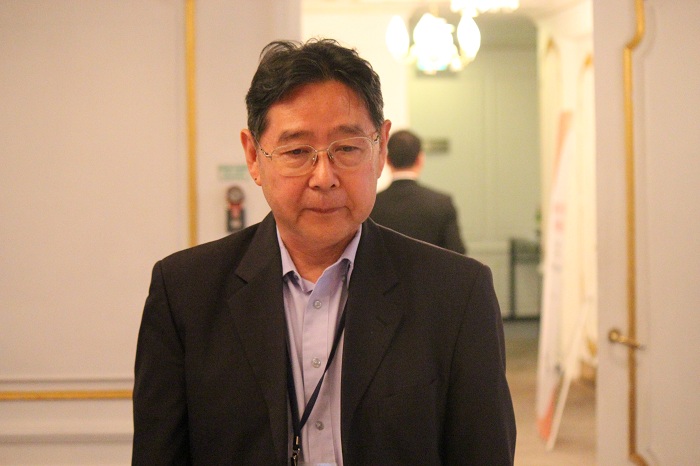
Wu Changsheng is head of the Chinese delegation. (photo: Wi Tack-whan)
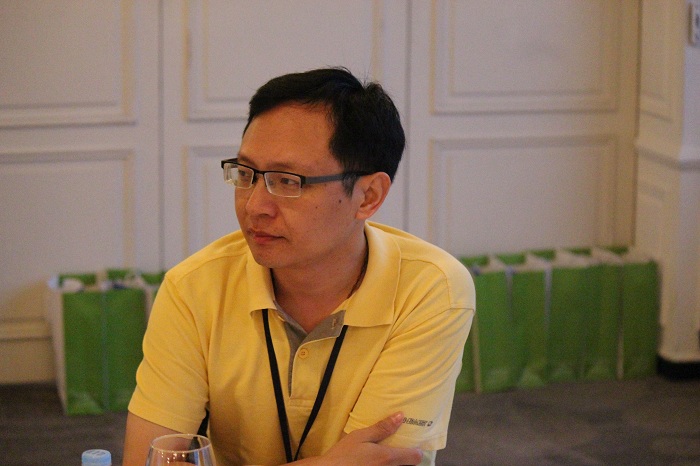
Wu Danhong is an associate professor of political science and law at China University. He is an active blogger at Tencent Weibo, a Chinese microblogging site. (photo: Wi Tack-whan)
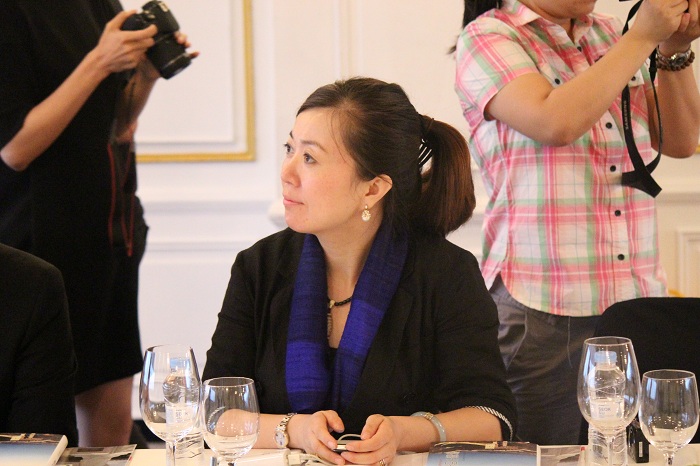
Luan Yimei is a professor of media studies at Peking University. Her verified blog at Sohu.com has more than 660,000 fans. (photo: Wi Tack-whan)
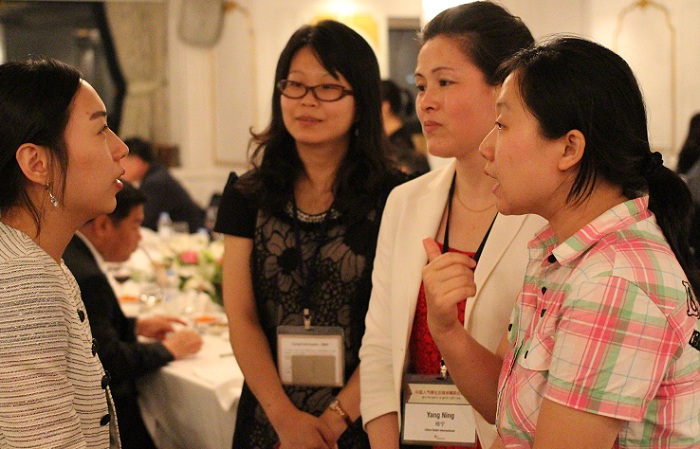
Participants from Korea and China talk about the cultural similarities and differences between their two countries. (photo: Wi Tack-whan)
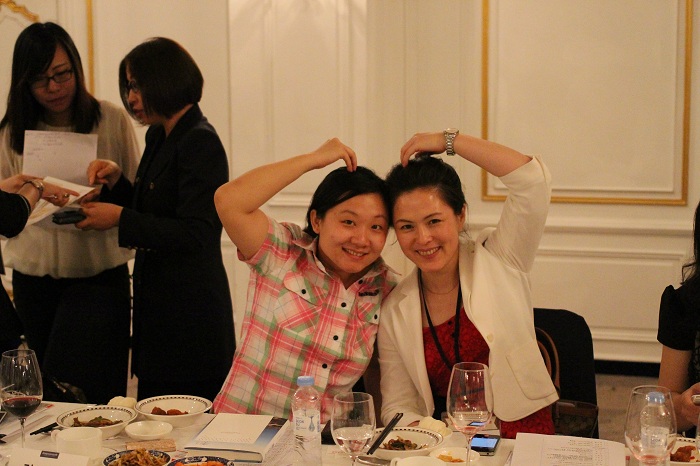
Yang Ning, senior editor at China Radio International (left), and Ren Shuai, editor-in-chief at the Xunlei Kankan online content producer (right), enjoy being at the banquet. (photo: Wi Tack-whan)
Most popular
- China warmly welcomes first Korea-born giant panda Fu Bao
- First hearing-impaired K-pop act hopes for 'barrier-free world'
- Novelist Hwang's 'Mater 2-10' shortlisted for Int'l Booker Prize
- Expats could account for 7% of population in 20 years: report
- Nat'l Fire Agency picks 137 elite staff for deployment abroad













